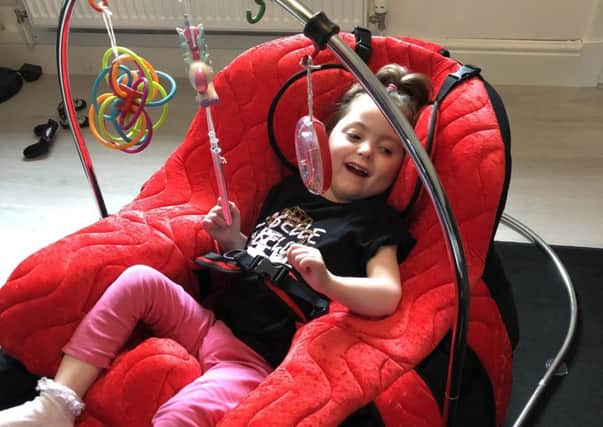Glenrothes 3-year-old sitting pretty with new P Pod chair


Newlife, a charity which provides specialist equipment and support to disabled and terminally ill children, launched an appeal to help raise £1,184 to purchase the P Pod seat.
Emelia McDonough from Glenrothes, was born prematurely at 25 weeks and needed emergency surgery to remove part of her bowel. Such a traumatic start in life left Emelia with severe brain damage and she is unable to walk or sit without support and is even unable to carry the weight of her own head. As a result, Emelia was at risk of developing Scoliosis.
Advertisement
Hide AdAdvertisement
Hide AdHer mum Lorraine said: “It took us a really long time to get some functional seating from the local authority. But Emelia could only sit in it for short periods of time because she has to work really hard to keep her little body in that position. The only other option we had was to sit her on the sofa but this doesn’t support her properly and affects her posture and her breathing as well. Because of her condition she should have a clear 24 hour postural care plan reducing the risk of scoliosis developing in her spine – but without the right equipment it just isn’t possible.”
Talking about her new P Pod chair, Lorraine added: “She is clearly in a lot less pain now – she saw the physiotherapist only yesterday and they were really happy with how well she is doing and the shape of her spine. And Emelia just loves it – it is just the most wonderful thing to see her happy, she’s able to play with her little brother now, which she couldn’t do before.”
Newlife’s consultant nurse, Karen Dobson, said: “The right kind of postural support can reduce the likelihood of conditions deteriorating and additional conditions like scoliosis from occurring – and of course can reduce the need for invasive surgery further down the road.
“Expensive surgery puts further pressure on the NHS and local health authorities so investing in the right supportive equipment that limits the need for surgical intervention is actually saving money in the long run and could potentially free up budget to be spent in other areas.”